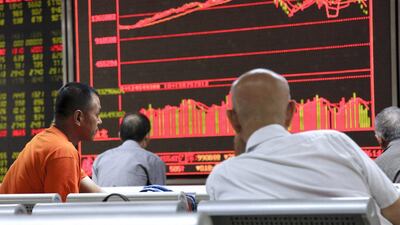Shares in the UAE returned to something closer to normality on Wednesday, largely clinging on to Tuesday’s gains even as concerns about the longer- term effect of lower oil prices persist.
Dubai’s headline share index, which surged by 4.61 per cent during trading on Wednesday, ended the day 1.4 per cent lower at 3,507.27.
Investors booked gains from the previous session in blue chips such as Arabtec and Dubai Investments, which ended the day down 4 per cent and 3.7 per cent, respectively.
Dubai Islamic Bank and Emirates NBD were among a handful of gainers, closing up 0.9 per cent and 0.6 per cent.
“The last two days have been a correction from the overselling that we saw at the start of the week,” said Ahmed Waheed, a vice president of institutional trading at Menacorp in Dubai.
“What we saw [yesterday] was basic profit taking after buying power came back into the market on Tuesday – namely people cashing in on the previous day’s gains.”
A similar picture emerged on the Saudi stock market, which had bounced back up 7.3 per cent on Tuesday after two days of heavy losses. The Tadawul All Share Index ended yesterday down 2.1 per cent at 7,384.46.
US stock markets also opened up on Wednesday, after a volatile Tuesday that had marked a sixth straight day of decline for the Dow industrials index.
Shares in Abu Dhabi, which rebounded by 1.6 per cent on Tuesday, were virtually unchanged yesterday, ending the day down at 4,329.94.
Other Arabian Gulf bourses had a similarly quiet day, all closing less than 0.5 per cent up or down.
Dubai and Saudi Arabia’s headline indexes remain 5.5 per cent and 7.8 per cent down, respectively, since the start of the week, with the prospect of further instability in the coming months.
“There are still a lot of questions about the longer-term impact of the new cheaper oil era, the slowdown in spending by governments and what impact the China will have,” said Mr Waheed. “The picture is only likely to become clearer in a few months when regional corporates start to release their third-quarter numbers, and if and when we get more announcements from governments on spending.”
Oil prices remained stable for the second day in a row on Wednesday, with brent crude trading up 14 cents at US$43.35 a barrel yesterday evening.
The prospects for the UAE are brighter than those of Saudi Arabia, according to Mr Waheed, who noted Saudi Arabia’s commitments in Yemen, where it is leading a military coalition against the country’s Houthi rebels, far outweigh those of the UAE.
Also yesterday, Bloomberg reported that the Saudi government was conducting a review of capital-spending plans with advisers and might be contemplating budget capital expenditure cuts of 10 per cent or more.
Jean-Michel Saliba, a Mena economist at Bank of America Merrill Lynch, described the news as “an important development”, but that the scale of spending cuts being contemplated “would still imply a budget deficit in the low double digits next year, in our view”.
Ahmed Abdulkarim Alkholifey, the deputy governor for research and international affairs at the Saudi Arabian Monetary Agency, told the Al Arabiya television network on Tuesday that the country was committed to the Saudi riyal’s peg to the US dollar amid rising speculation that the kingdom would devalue its currency, following recent similar moves by China and Kazakhstan.
Alp Eke, a senior economist for the Mena region at National Bank of Abu Dhabi, said an end to the Saudi riyal’s peg would “most probably lead to a significant devaluation of the currency”. He noted that it would also increase Saudi Arabia’s exposure to oil-price fluctuations, as oil is priced in US dollars.
The Chinese government’s decision on Tuesday to cut its main interest rate by 0.25 percentage points to 4.6 per cent failed to halt the sell-off of equities on the Shanghai Composite, which finished a roller-coaster day down by 1.2 per cent. European bourses, however, were largely unaffected by events in China, finishing the day little changed after Tuesday’s strong rebounds.
The Dow Jones Industrial Average opened the day 2.7 per cent higher.
jeverington@thenational.ae
Follow The National's Business section on Twitter

